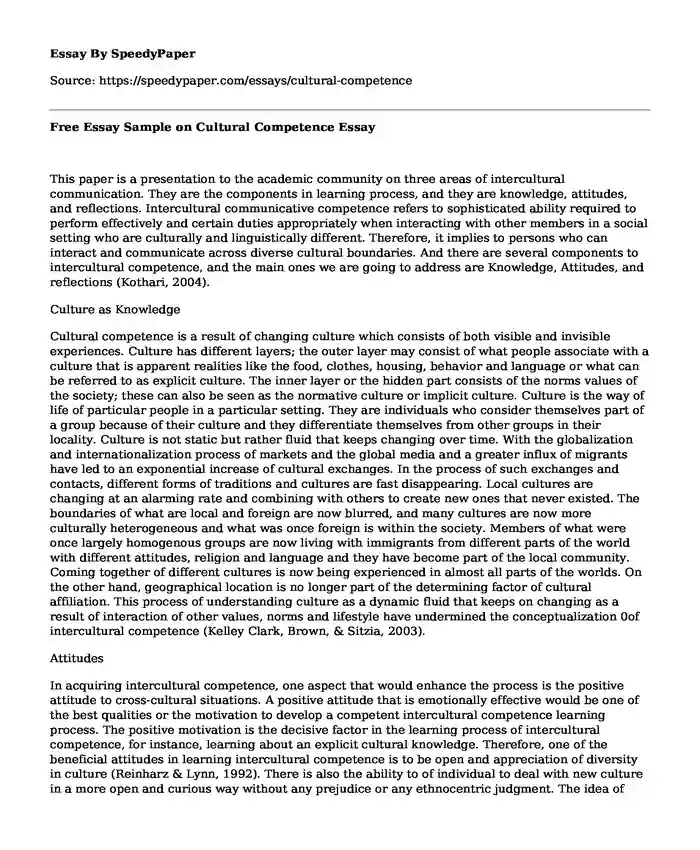
| Type of paper: | Essay |
| Categories: | Culture Communication Multiculturalism |
| Pages: | 3 |
| Wordcount: | 759 words |
This paper is a presentation to the academic community on three areas of intercultural communication. They are the components in learning process, and they are knowledge, attitudes, and reflections. Intercultural communicative competence refers to sophisticated ability required to perform effectively and certain duties appropriately when interacting with other members in a social setting who are culturally and linguistically different. Therefore, it implies to persons who can interact and communicate across diverse cultural boundaries. And there are several components to intercultural competence, and the main ones we are going to address are Knowledge, Attitudes, and reflections (Kothari, 2004).
Culture as Knowledge
Cultural competence is a result of changing culture which consists of both visible and invisible experiences. Culture has different layers; the outer layer may consist of what people associate with a culture that is apparent realities like the food, clothes, housing, behavior and language or what can be referred to as explicit culture. The inner layer or the hidden part consists of the norms values of the society; these can also be seen as the normative culture or implicit culture. Culture is the way of life of particular people in a particular setting. They are individuals who consider themselves part of a group because of their culture and they differentiate themselves from other groups in their locality. Culture is not static but rather fluid that keeps changing over time. With the globalization and internationalization process of markets and the global media and a greater influx of migrants have led to an exponential increase of cultural exchanges. In the process of such exchanges and contacts, different forms of traditions and cultures are fast disappearing. Local cultures are changing at an alarming rate and combining with others to create new ones that never existed. The boundaries of what are local and foreign are now blurred, and many cultures are now more culturally heterogeneous and what was once foreign is within the society. Members of what were once largely homogenous groups are now living with immigrants from different parts of the world with different attitudes, religion and language and they have become part of the local community. Coming together of different cultures is now being experienced in almost all parts of the worlds. On the other hand, geographical location is no longer part of the determining factor of cultural affiliation. This process of understanding culture as a dynamic fluid that keeps on changing as a result of interaction of other values, norms and lifestyle have undermined the conceptualization 0of intercultural competence (Kelley Clark, Brown, & Sitzia, 2003).
Attitudes
In acquiring intercultural competence, one aspect that would enhance the process is the positive attitude to cross-cultural situations. A positive attitude that is emotionally effective would be one of the best qualities or the motivation to develop a competent intercultural competence learning process. The positive motivation is the decisive factor in the learning process of intercultural competence, for instance, learning about an explicit cultural knowledge. Therefore, one of the beneficial attitudes in learning intercultural competence is to be open and appreciation of diversity in culture (Reinharz & Lynn, 1992). There is also the ability to of individual to deal with new culture in a more open and curious way without any prejudice or any ethnocentric judgment. The idea of being open and appreciating other diverse cultures would need some effort and has psychological limits. For example, when learning a new language or cultural education cultural blindness to foreign culture would lead to uncertainties or anxieties which may result in self-defense and offending others (Robson, 1993).
Reflections
Ability to change perspectives and expand one's frame of reference and the horizon of understanding will comprise the overall reflections. This is a point of ethnorelative view perspective that will lead to an effective form of communication in a foreign language (Jansen, 2010).
Reference page
Jansen, H. (2010). The logic of qualitative survey research and its position in the field of social research methods. Forum: Qualitative Social Research, 11(2), Art. 11, Retrieved from http://nbn-resolving.de/urn:nbn:de:0114-fqs1002110.
Kelley, K., Clark, B., Brown, V., and Sitzia, J. (2003). Good practice in the conduct and reporting of survey research. International Journal for Quality in Health Care. Retrieved from http://intqhc.oxfordjournals.org/content/15/3/261
Kothari, C. R. (2004). Research methodology: Methods and techniques. New York, NY: New Age International. Print.
Reinharz, S and Lynn, D. (1992). Feminist methods in social research. New York, NY: Oxford University Press.
Robson, C. (1993) Real-world research: A resource for social scientists and practitioner-researchers. Washington, DC: Blackwell Publishers.
Cite this page
Free Essay Sample on Cultural Competence. (2017, Sep 11). Retrieved from https://speedypaper.net/essays/cultural-competence
Request Removal
If you are the original author of this essay and no longer wish to have it published on the SpeedyPaper website, please click below to request its removal:
- Free Essay on Corporate Communications: Immigration Reform
- Free Essay with a Formal Analysis of Ahmed Morsi's The Family
- Essay Sample Dedicated to the Quality Initiatives in US Healthcare
- Can the Global South Attain Food Security Without the Green Revolution? Essay Sample
- Essay Example about Attention and Consciousness
- Stuttering and Speech Perception by Others
- Professional Communication in Healthcare Systems - Essay Sample
Popular categories




